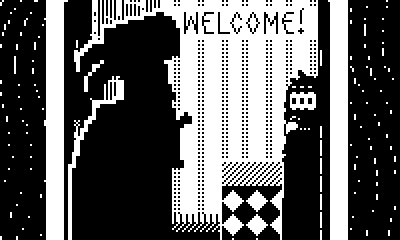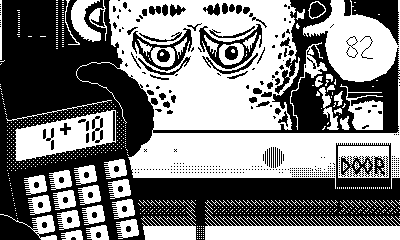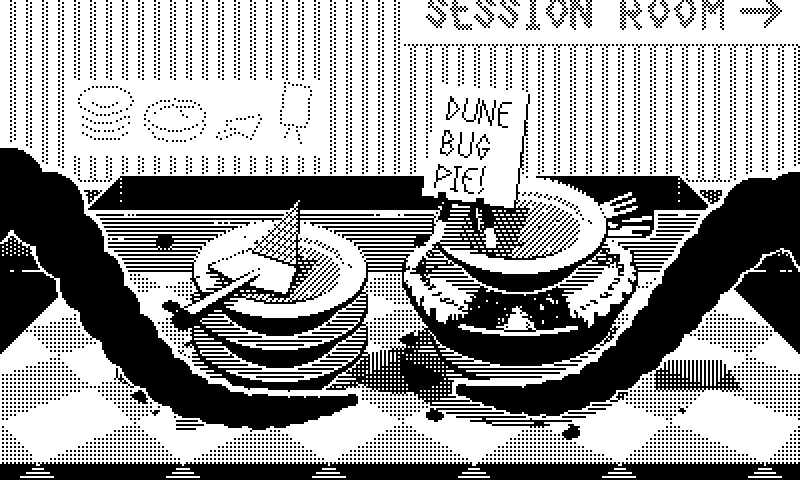While the Playdate is chock-full of fun games (including Under the Castle, which I recently reviewed), one has loomed over them all since even before the handheld’s launch: Lucas Pope’s alien support group manager Mars After Midnight. It came as a surprise that the follow-up to Pope’s industry-defining hits Papers, Please and Return of the Obra Dinn would only be available to the Playdate’s small audience, but this only amplified the anticipation within the handheld’s niche community. It was impossible to escape Reddit posts and the like inquiring about when this game shrouded in mystery would be made available. It thus goes without saying that Mars After Midnight is the marquee release for Playdate—the platform’s highest profile game to date—and now that it’s finally released, is it the killer app that many hoped for?
It’s first important to understand what Mars After Midnight is: a spiritual successor to Pope’s career-launching classic Papers, Please. In that game you play the role of an immigration officer for a fictional Soviet country, tasked with the burden of stopping ne’er-do-wells from crossing the border before they can wreak havoc. Mars After Midnight instead opts for the lighter tone of managing which space beings to allow into late-night support groups themed around specific traits. The lower stakes resolve to a game more focused on simple fun over stressful pseudo-simulation. Whereas failure in Papers, Please resulted in not being able to support family members as they clung to life dollar-by-dollar, mistakes in this new title barely impact your finances and can be easily resolved through replaying a level. In other words, the tentacle-armed bird Martian Lerl (our player character) and their trusty robot sidekick will always end up living their best lives. The lighter tone suits the narrative stylings of your typical Playdate title and is a welcome divergence from serious topics Pope has become synonymous with.

What makes Pope’s ability to perfectly strike both tones all the more impressive is that he fills all the key development and artistic roles for his games. The cohesive vision this allows for shines through in Mars After Midnight. His soundscape of warbly synths and simple drum machine grooves evokes the sense of going through the day-to-day motions of work on an alien planet, telling a narrative through sound alone. The modulated Martian voices are equal parts charming and strange, endearing you to the diverse denizens of Mars, and other sound effects deftly guide your attention to the most important slice of gameplay happening at any given moment. Visually, Mars After Midnight evokes the DIY attitude sacrosanct to Playdate’s ethos while also presenting a level of detail and polish that holds up to scrutiny alongside his former titles; there’s a strong argument to be made that this is the platform’s best-looking game. Further, Pope’s understanding of “show, don’t tell” narrative techniques is on full display, expressing Lerl’s story through small cutscenes and gameplay interactions devoid of exposition.
However, this is also where the game’s many issues crop up. To touch on story issues without spoilers, the game anticlimactically undercuts the payoffs for the player’s hard work at key junctures by handing them the carrot from the stick rather than letting them grab it themselves. The first time this happened, I immediately felt disconnected from having any agency regarding Lerl’s journey, and the (ultimately correct) anticipation of it happening a second time cemented that disengagement. While story arguably isn’t the most important part of Mars After Midnight, it’s been the lynchpin of how Pope roped in player interest in his past work, and it’s disappointing to see it fall short here.
Meanwhile, the visuals suffer from being surprisingly underutilized in gameplay. There are seemingly endless wacky monster designs on display but their uniqueness—which is what you’re ultimately tasked with assessing to decide if they’re a fit for a support group—is easily overlooked when most mechanics require little more than pressing a button and gauging their reaction, or looking through a microscope which immediately makes obvious if they hold the trait you’re searching for. There’s rarely reason to view more of their visage than the glance shown through the latch window of a door because the mechanics don’t usually call for it. As such, while the monster designs are creative and wonderfully drawn, they’re done a disservice when not emphasized to the player.

Beyond just how mechanical implementation impacts visual appreciation, it’s also Mars After Midnight’s Achilles heel from a gameplay standpoint. Each level tasks you with searching for six Martians exhibiting a specific trait. Often you use a single unique item to carry out the task, ranging from simple magnifying glasses to wackier concepts like boxing gloves that root out Martians unable to dodge them. As previously noted, inspecting each Martian after they knock on the door typically requires a simple press of a button, and the instances that require a bit more brain work, like checking the answers they provide to math equations or discerning if they know a secret code, are exceptions to the rule. Unlike Papers, Please, these mechanics are thrown out after each level instead of having them build upon each other; while this simplification is a smart design choice for the Playdate’s capabilities, it’s taken to an extreme where the game loses its element of tension. In fact, the game is so easy that I never made a single mistake throughout the process, and this is coming from someone who made many in Pope’s past work. There were missed opportunities even for easy complexities to be added, such as asking for two traits to be checked, or swapping up static traits like secret codes between each Martian to keep players on their toes. Elements like this could’ve also helped add replay value to a game that’s otherwise quite short, clocking in at roughly three hours.
What makes these major shortcomings all the more unfortunate is that the game shows so much promise both in its polish and addictive gameplay loop. The mechanic of opening and closing the latch window with the crank never stops being fun, especially given that the crank works much more reliably than in some other Playdate games. The table cleaning minigame after each accepted monster—which uses the d-pad to pilot Lerl’s tentacle arms to re-set the table and the crank to sweep it—offers up a flavorful puzzle with enough variations not to get stale. The game does push you to complete this task as fast as possible to not keep Martians waiting for inspection, though I never discerned any notable punishment for taking too long, which cuts through the intended tension similar to the simplicity of inspections. Similarly, the money management segments between days—wherein you set up budgets for the next day’s marketing, equipment, and meals—are a great idea that served as the heart of Papers, Please; but in Mars After Midnight, they are rendered useless, as I was never once wanting for cash. Without offering any actual impactful choices to make beyond picking the clearly signposted best options for a given day, this aspect of the game ends up amounting to idle menuing.
Another of Mars After Midnight‘s great ideas is the blab-o-dex, which chronicles translations for the Martian language. However, this is rarely used in capacities that impact gameplay, and the occasions when it is used cover a total of five words you’ll quickly memorize. There’s a lot of potential here and I love the modulation effects used to create the language. However, the underuse of the mechanic despite the obvious love that went into building it relegates it to simply a fun bit of flavor. Again, it’s hard not to make comparisons to Papers, Please, wherein flipping through manuals to check information is the core gameplay mechanic, meaning we know just how effective it can be. But comparisons aside, systems like the blab-o-dex and level-specific equipment feel like disjointed ideas that offer variety but not substance.
All this said, the game’s charms do carry it while it lasts, and the $6 price point makes Mars After Midnight easy to recommend to those curious regardless of the game’s shortcomings. It’s at bare minimum a beautiful package, particularly in the audiovisual department, and a welcome respite from Pope’s more tonally serious works. However, peek behind the curtain and you’ll find a game with little substance to match its flashiness. In fact, the lacking execution of the many gameplay ideas often counteracts the game’s aesthetic strengths, actively detracting from them. Mars After Midnight will likely put a smile on your face from time to time—which will be enough to entice some people—but those looking for the layered depth Pope made his name on won’t find it here.



